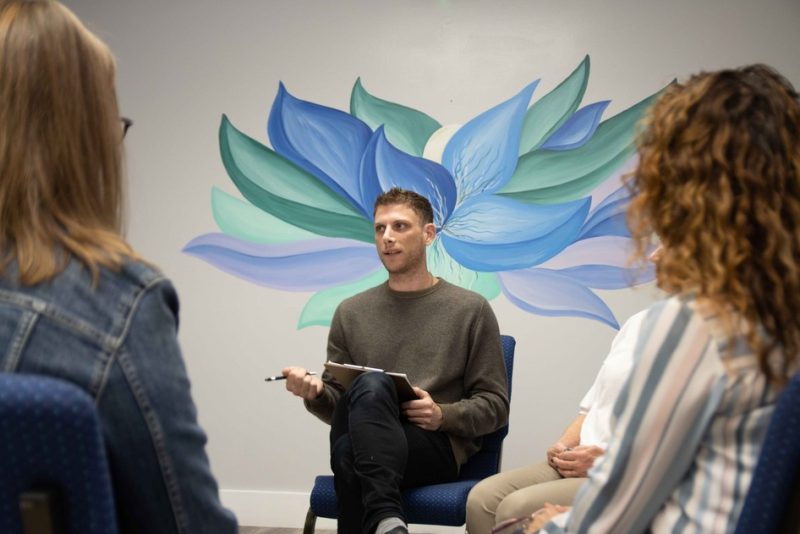The Sylvia Brafman Mental Health Center’s patient advocates believe mental health and substance abuse treatment should be accessible to all. We strive to facilitate barrier-free quality mental health programs for Georgia residents to address a broad range of psychiatric conditions, including depression, anxiety, addiction, bipolar disorder, and PTSD. Call 877-958-9212 to learn more.

Mental Health Treatment Programs Near Atlanta, Georgia
What Are Mental Health Disorders?
Mental health disorders are conditions that affect thinking, mood, and/or behavior, often causing significant distress and disrupting daily life. Mental illnesses range from anxiety and depression to more severe conditions such as schizophrenia and bipolar disorder. They impact how we feel, act, and relate to others.
Mental health disorders can vary greatly in intensity and duration. Some individuals experience brief episodes, while others may face ongoing challenges. Each disorder has unique symptoms and may require different treatments, from psychotherapy and medication to lifestyle changes, self-care, and support groups. Recognizing and addressing mental health disorders early can profoundly improve emotional well-being and overall quality of life.
What Levels of Care are Offered at Mental Health Treatment Centers in Atlanta, GA
Mental Health Treatment Centers offer multiple levels of care supporting mental wellness. Psychotherapy and psychiatry services are tailored to individual needs, providing everything from structured outpatient care to intensive inpatient treatment. Our specialized programs incorporate evidence-based approaches to help you achieve lasting recovery. Take advantage of our free assessment to determine the most suitable care for your needs.

Statistics and Information on Mental Health Programs in Georgia
In Georgia, a concerning reality unfolds regarding mental health care access. A Forbes study has placed the state second to last in the nation for mental health services, highlighting a troubling landscape. According to the National Alliance on Mental Illness (NAMI), among the 391,000 adults who required mental health care but didn’t receive it, 45.4% cited cost as a barrier.
The situation is exacerbated by other alarming statistics, revealing that 33.9% of adults in Georgia experienced symptoms of anxiety or depression in early 2023, slightly above the national average. Furthermore, the Substance Abuse and Mental Health Services Administration reports a rising trend in serious mental illness among adults over the past decade. Compounding the issues, 17% of Georgians—nearly two million people—lack insurance. The Griffin Daily News notes that just 11 out of every 1,000 residents are currently receiving mental health care. Despite federal mandates requiring insurance parity for mental and physical health care, NAMI Georgia’s executive director highlighted to NPR that this standard is often unmet, particularly in rural areas. As the gap widens between need and access, Georgia’s mental health crisis continues to deepen, leaving many residents vulnerable and underserved.
At The Sylvia Brafman Mental Health Treatment Center in Fort Lauderdale, Florida, our team of dedicated professionals is ready to guide you. We offer IOP and a variety of treatment programs, each uniquely designed to meet your needs. We’re also able to offer accommodation at affordable rates if you’re traveling from out of state. So don’t wait—reach out to us today! Either give us a call or fill out the form below to request a callback.
"*" indicates required fields

What is Treated at a Mental Health Treatment Center in Atlanta, Georgia?
A mental health treatment center in Georgia provides specialized care for combating a range of mental health challenges. These centers offer professional support to help you or your loved one understand and manage your condition(s) in a compassionate, therapeutic environment. Below are examples of conditions commonly treated at mental health centers, though this list is not exhaustive.

Does Health Insurance Cover the Cost of Mental Health Programs in GA?
Yes, health insurance often covers the cost of mental health programs, including psychotherapy, counseling, and rehabilitation. However, coverage varies widely by plan and other influential factors. Be sure to check your insurance for mental health rehabilitation programs to understand the details as they apply to your treatment needs. You can also contact us for assistance in navigating this information.
Mental health coverage typically includes outpatient therapy sessions with a licensed mental health counselor in Georgia, partial hospitalization, and sometimes residential treatment. Some plans may require prior authorization or referrals, so reviewing your policy details or speaking with an insurance representative can help clarify specific benefits. However, contacting The Sylvia Brafman Mental Health Center can simplify health insurance verification. Our patient advocates can provide all the necessary details without the wait times and insurance jargon, ensuring access to the proper care.
Which Health Insurance Providers Cover Behavioral Health Programs in Georgia?
Several health insurance providers cover behavioral health programs in the State of Georgia, including major brands like Blue Cross Blue Shield, Aetna, Cigna Healthcare, and the New York State Health Insurance Program (NYSHIP). Many plans offer comprehensive mental health benefits, including coverage for psychotherapy, counseling, addiction treatment, and intensive rehabilitation programs.
It’s always important to check your specific plan details, as coverage can vary significantly. Some plans may limit the number of therapy sessions or require prior authorization for certain treatments. If you’re unsure about your coverage, don’t hesitate to reach out to your insurance company or a healthcare provider like Sylvia Brafman. Our patient advocates have solid relationships with many insurers and can seamlessly assist in navigating your benefits. Finding the right program for your mental health needs is our priority.
How to Find a Licensed Mental Health Facility Near Atlanta, Georgia
Finding a licensed mental health treatment center near Atlanta, Georgia, is possible with The Sylvia Brafman Mental Health Center’s assistance. Not only can we recommend the most appropriate mental health programs in Georgia and surrounding regions, but we can also advise you on the mental health treatment services that are ideal for your current needs and symptoms. Call 877-958-9212 today.
- The Sylvia Brafman Mental Health Center, 7710 NW 71ST CT, Tamarac, Florida, 33321

Treatment and Therapies for Mental Health Disorders in Greater Atlanta, GA
Family-based treatment facilities offer a range of therapy programs catering to the diverse needs of individuals and their families. These therapeutic interventions are designed to address a broad spectrum of mental health disorders, enhance communication, and strengthen family dynamics. While the following examples are not exhaustive, they provide insight into the variety of therapeutic approaches employed in these family-centered settings.

What is the Mental Health Program Admissions Process in Georgia?
Understanding the mental health program admissions process at mental health facilities in Georgia can help you prepare for your recovery. While the specifics may differ between treatment centers, here’s a general overview of what you can expect as you embark on this important, courageous endeavor toward a healthier you:
What Happens at a Mental Health Disorder Treatment Center?
When you enter a mental health disorder treatment center, you can expect a supportive, structured environment that emphasizes healing and recovery. The first step typically involves a thorough assessment, where professionals evaluate your mental health history and current challenges. This helps the treatment team develop a personalized plan tailored to your needs.
During your stay, you’ll engage in various therapeutic activities, including individual and group psychotherapy focused on coping strategies, stress management, and emotional regulation. Many centers also incorporate holistic approaches like mindfulness, art and music therapy, and fitness activities to enhance overall well-being. The goal is to equip you with the tools to manage your mental health effectively. As you progress, the team will assess your needs and adjust as needed, empowering you to develop the skills necessary for a healthier, more fulfilling life post-treatment.

How Many Times Can One Get Mental Health Therapy and Treatment with Health Insurance?
The frequency of mental health therapy and treatment you can access with health insurance often depends on your specific plan and the recommendations of your healthcare provider. Many plans cover a set number of sessions annually, ranging from a few to several dozen, depending on medical necessity and policy details.
Reviewing your insurance policy for any limitations on session frequency or maximum annual visits is crucial. Additionally, your mental health provider may recommend a treatment plan that outlines how often you should attend sessions based on your unique circumstances. Open communication with your healthcare provider and insurer can help facilitate the care you need without exceeding your coverage limits.



